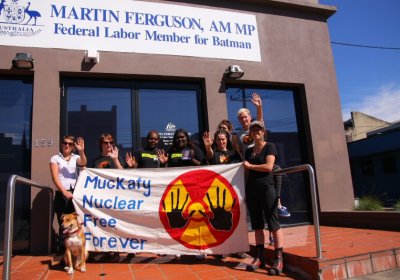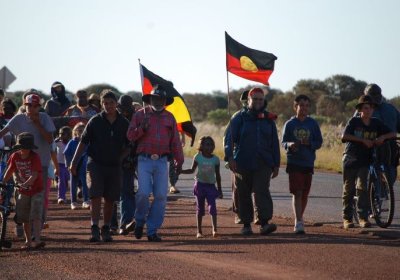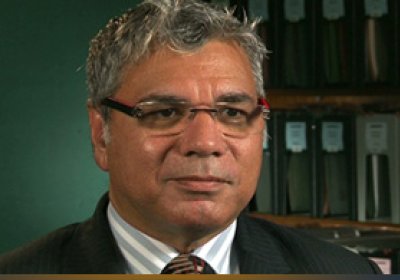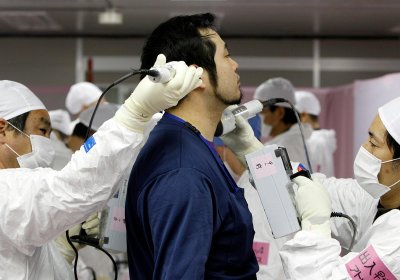The story behind the corporation that owns the Beverley uranium mine in north-east South Australia is scarcely believable.
Heathgate Resources — a 100%-owned subsidiary of General Atomics (GA) — owns and operates Beverley and has a stake in the adjacent Beverley Four Mile mine. Over the years, GA CEO Neal Blue has had commercial interests in oil, Predator drones, uranium mining, nuclear reactors, cocoa, bananas and real estate.
Jim Green
A nuclear war using as few as 100 weapons would disrupt the global climate and agricultural production so severely that the lives of more than a billion people would be at risk, according to research released in April by International Physicians for the Prevention of Nuclear War and its Australian affiliate, the Medical Association for Prevention of War.
A nuclear war using as few as 100 weapons would disrupt the global climate and agricultural production so severely that the lives of more than a billion people would be at risk, according to research findings released in April by International Physicians for the Prevention of Nuclear War and its Australian affiliate, the Medical Association for Prevention of War.
Four Muckaty traditional owners — Penny Phillips, Jeannie Sambo, Kylie Sambo and Delvine Spiteri — visited Melbourne on June 25 to attend a federal court hearing concerning the nomination of Muckaty, 120 kilometres north of Tennant Creek in the Northern Territory, for a national nuclear waste dump.
These are interesting times in the uranium sector. The mining companies have had a few wins in the 14 months since the Fukushima disaster, but they've had more losses.
Bill Repard, organiser of the Paydirt Uranium Conference held in Adelaide in February, put on a brave face with this claim: The sector's hiccups in the wake of Fukushima are now over with, the global development of new nuclear power stations continues unabated, and the Australian sector has literally commenced a U-turn in every sense.
The nuclear industry has been responsible for some of the crudest racism in Australia's history. This racism dates from the British nuclear bomb tests in the 1950s but it can still be seen today.
The British government conducted 12 nuclear bomb tests in Australia in the 1950s, most of them at Maralinga in South Australia. Permission was not sought from affected Aboriginal groups such as the Pitjantjatjara, Yankunytjatjara, Tjarutja and Kokatha. Thousands of people were adversely affected and the impact on Aboriginal people was particularly profound.
Warren Mundine, a member and former National President of the ALP, and co-convener of the Australian Uranium Association’s Indigenous Dialogue Group, has been promoting the nuclear industry recently. Unfortunately he turns a blind eye to the industry's crude racism, a problem that ought to be core business for the Indigenous Dialogue Group.
March 11 was the first anniversary of the Tohoku earthquake and tsunami in north-east Japan and the meltdowns, explosions and fires at the Fukushima nuclear plant.
The impacts of the nuclear disaster have been horrendous. More than 100,000 people are still homeless and some will never be able to return.
Homeless, jobless, separated from friends and family, the toll on people's health and mental well-being has been significant — one indication being a sharp rise in suicide rates. One farmer’s suicide note simply read: “I wish there wasn’t a nuclear plant.”
Prime Minister Julia Gillard's arguments in favour of uranium sales to India are dangerous and dishonest.
She fails to even acknowledge the crucial problem – India's refusal to sign the Nuclear Non-proliferation Treaty (NPT).
The NPT is the main international nuclear treaty and is routinely described by Australian political leaders as the "cornerstone" of the non-proliferation system. The NPT has its flaws, not least the failure of the nuclear weapons states to take their disarmament obligations seriously, but that is no reason to junk the treaty or to disregard it.
Toro Energy has submitted an application to build Western Australia’s first uranium mine, at Wiluna, the start of WA’s iconic Canning Stock Route.
The debate over the proposed mine has far-reaching ramifications. The construction of WA’s first uranium mine is likely to be the “thin edge of the wedge”, whereas a strong show of public opposition can significantly increase the likelihood of keeping WA uranium-free.
That, in turn, is important in the context of the national debate over uranium mining.
Several months after the Fukushima nuclear disaster, we’re beginning to get a sense of the likely long-term impacts.
Radiation has spread across much of the northern hemisphere and parts of the southern hemisphere, including northern Australia.
Japan’s Nuclear and Industrial Safety Agency estimates the radioactive release at 770,000 terabecquerels in the first week of the crisis.
Total radiation releases will probably fall somewhere between 10-40% of those from the 1986 Chernobyl disaster. Radiation releases have not been stopped and will continue for some months.
With the 25th anniversary of Chernobyl falling on April 26, a debate is brewing over the estimated death toll from the nuclear disaster. The debate has erupted with a heated exchange between prominent British columnist George Monbiot and anti-nuclear campaigner Dr Helen Caldicott.
Monbiot claims the “official death toll” from Chernobyl is 43. Caldicott puts the death toll at 985,000. Someone's wrong. Perhaps they both are.
- Previous page
- Page 2
- Next page










